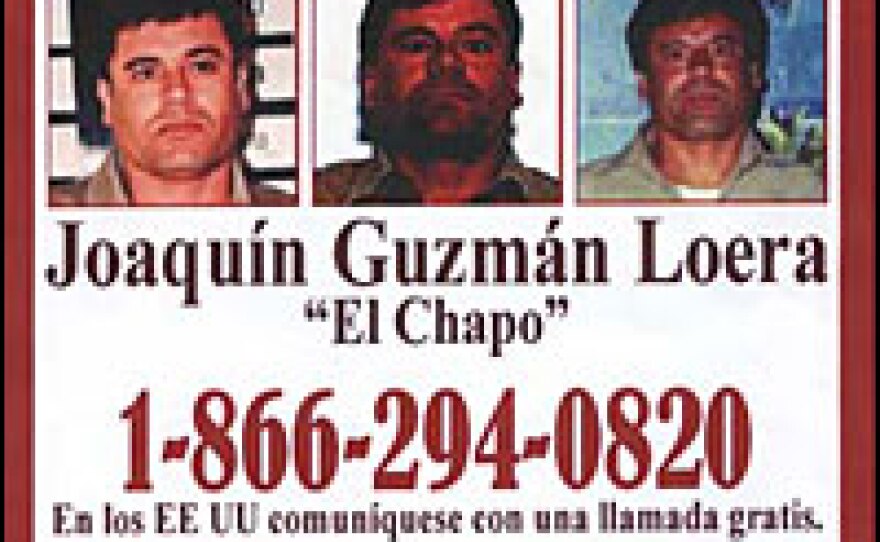
The most wanted man in Mexico, Joaquin "El Chapo" Guzman, allegedly moves billions of dollars' worth of drugs into United States each year. His Sinaloa drug cartel is one of the key players in a narcotics war that has killed more than 2,000 people this year across Mexico.
Since his escape from prison in 2001, Guzman has built the Sinaloa cartel into one of the most powerful — and most brutal — criminal organizations in Latin America, and he has become what Pablo Escobar was in the 1990s — one of the pre-eminent drug smugglers of his day.
A 'Top' World Criminal
The Mexican government has deployed thousands of soldiers and federal police to fight Guzman — who goes by his nickname "El Chapo," or Shorty — yet his drugs continue to flow and the death toll from his battles with rival gangs and the Mexican government continues to escalate.
"He's definitely one of the top criminals in the world right now. No doubt in my mind," says Jack Riley, the special agent in charge of the U.S. Drug Enforcement Administration's El Paso Division.
Just across the border from Riley in Juarez, Guzman is currently fighting for control of the lucrative Juarez/El Paso smuggling corridor. The struggle between Guzman and the Juarez cartel has already left more than 550 people dead this year.
Riley says Guzman has gained control of various areas in Mexico through brute force and bribery.
"He remains fairly safe in Mexico because of his influence and ability to corrupt, because of the money he makes," Riley says.
And if buying off the local police doesn't work, Guzman's hit men might chop off their heads and leave a note warning other officers to be more cooperative.
In addition to the Sinaloa cartel, there are four or five other powerful drug cartels in Mexico — and Guzman is currently at war with two of them.
He is fighting the Juarez cartel at the border, the Beltran Leyva brothers along the Pacific coast in Sinaloa, and on top of this, he is fighting the Mexican government in what Mexican President Felipe Calderon calls his "Narco War."
Humble Beginnings
Guzman was born on Christmas Day of 1954 in a small village in the Pacific coast state of Sinaloa. He started out as an uneducated peasant, says Howard Campbell, a professor at the University of Texas at El Paso, who has written about Guzman and the Mexican drug trade.
"He worked his way up — he was connected by family connections to various cartel leaders," Campbell says. "He was a loyal soldier in the drug trade. Eventually he became powerful; he started to run his own sort of mini-cartel."
Then in 1993 Guzman was arrested and sent to the maximum security Puente Grande prison.
Attorney Jose Antonio Ortega Sanchez interviewed Guzman there and says Guzman dictated the conditions of his confinement.
"For example, the interview began at 11 o'clock at night," Ortega says. Ortega's first question was what caused the delay.
"Chapo said, completely calmly, that he'd just had a conjugal visit," Ortega recounts, "and afterwards he'd needed a shower and a little nap."
A few weeks later, Guzman broke out, allegedly in the back of a laundry truck, and he's been on the run ever since.
'A Social Bandit'
Campbell says Guzman's escape in 2001 made him famous, particularly in Sinaloa.
"And he became a kind of folk hero, a social bandit, and eventually reorganized his cartel to make it the strongest one in Mexico," Campbell says.
The Sinaloa cartel cultivates marijuana in remote areas of the Sierra Madre. It manufactures methamphetamines and ferries cocaine, cash and weapons throughout the hemisphere. Recently, cartel members have even been caught moving drugs in specially constructed submarines that putter along the coast.
Campbell says that despite a $5 million reward for Guzman's arrest, he has kept a fairly public profile.
A year ago, Campbell says, "hundreds of his armed people took over the town and he was publicly married."
But Guzman and his organization have not been invincible — the battle for the El Paso corridor has been bloody and still remains unresolved, and the Mexican government has seized tons of his drug shipments this year.
In April, Guzman's son Edgar got out of prison only to be gunned down outside a shopping mall a month later by at least 20 men from a rival cartel; police found more than 500 shell casings at the scene.
Guzman is also fighting for control of his home base of Culiacan, in northwestern Mexico.
So far this year, 58 officers have been killed in the city, and it has been equally bloody for Guzman and his rivals.
Respect For The 'Narcos'
Yet despite the violence, there are CDs for sale in the market with songs praising Chapo Guzman.
Ismael Bojorquez Perea, the editor of a small weekly newspaper in Culiacan, says some people in this relatively poor state see El Chapo as a successful, wily businessman.
"Unfortunately many people, not all, view the narcos with respect," Bojorquez says. "And they view the lifestyle of the narco-traffickers as a lifestyle that's worthwhile."
As Mexico's most wanted criminal, Guzman is moving constantly and may even have had plastic surgery to disguise his appearance, law enforcement officials say. But despite being on the run, he remains one of the most powerful criminals in the hemisphere.
Copyright 2022 NPR. To see more, visit https://www.npr.org. 9(MDAzMjM2NDYzMDEyMzc1Njk5NjAxNzY3OQ001))






